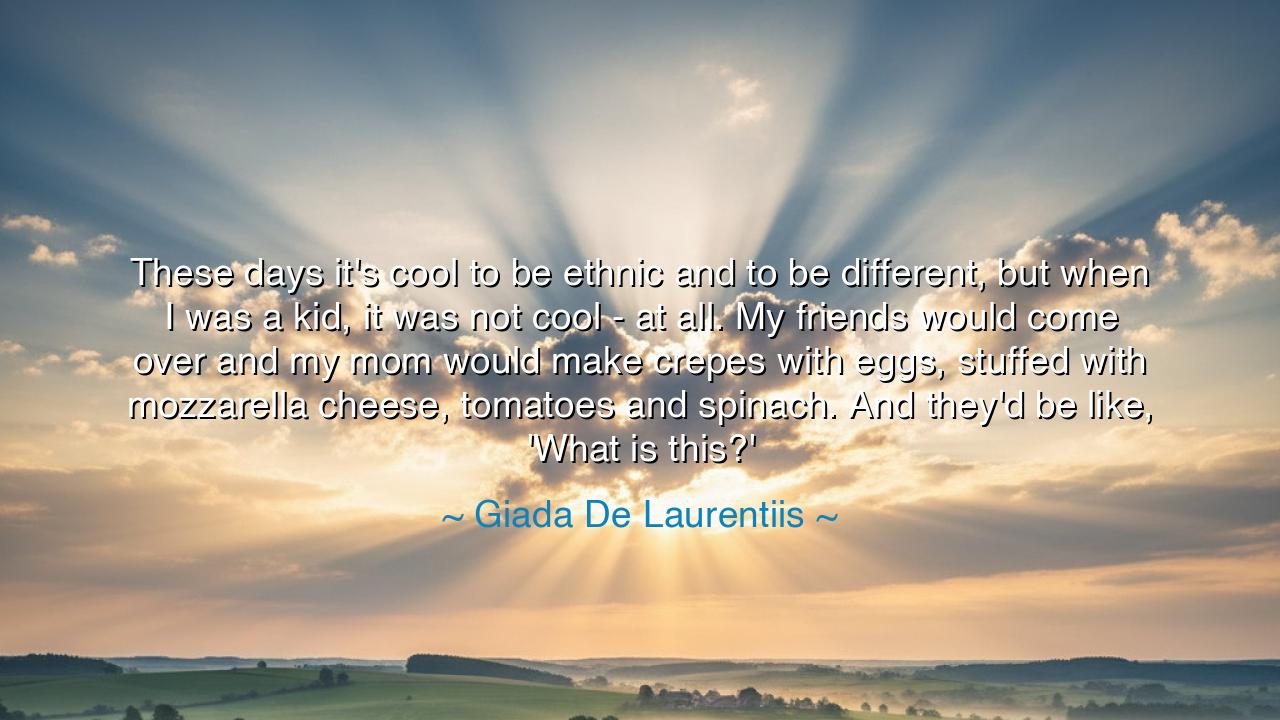
These days it's cool to be ethnic and to be different, but when I
These days it's cool to be ethnic and to be different, but when I was a kid, it was not cool - at all. My friends would come over and my mom would make crepes with eggs, stuffed with mozzarella cheese, tomatoes and spinach. And they'd be like, 'What is this?'






**Hear me, O children of the earth, for the words of Giada De Laurentiis carry a powerful reflection on the nature of identity, culture, and the ever-changing views of what is deemed "cool." She said—"These days it's cool to be ethnic and to be different, but when I was a kid, it was not cool - at all. My friends would come over and my mom would make crepes with eggs, stuffed with mozzarella cheese, tomatoes, and spinach. And they'd be like, 'What is this?'" In these words, De Laurentiis speaks to the journey of cultural pride and the evolution of social norms, highlighting how what was once dismissed or mocked can, over time, become something to be celebrated and admired.
What does it mean to be "ethnic" or "different"? In the past, being ethnic often meant being alienated, being set apart from the mainstream culture that held the power to define what was popular, what was cool, and what was acceptable. Ethnicity was often seen as something that set one apart, something that made a person stand out in a world that favored uniformity. De Laurentiis’ experience of sharing her family’s ethnic food with friends reflects the difficulty of growing up in a society that valued conformity over the diversity of culture. The dishes her mother made—crepes with eggs, mozzarella cheese, tomatoes, and spinach—were not understood by her peers as anything more than foreign or strange. This moment reflects the universal struggle of being different in a world that often rejects that which it does not understand.
In the ancient days, Alexander the Great, one of the most renowned conquerors in history, brought together Eastern and Western cultures through his conquests, creating the fusion we now call Hellenistic culture. He embraced the differences of the lands he conquered, seeing the beauty in diverse traditions rather than enforcing the idea of a singular, uniform culture. Alexander’s understanding of the value of cultural exchange and the richness it brought to both his empire and the world shows us that differences—whether in food, language, or tradition—can be sources of strength and beauty, rather than causes for division. Just as Alexander blended cultures, so too does De Laurentiis speak to the blending of cultures in the modern world, where once foreign traditions and practices are now seen as cool and celebrated.
Similarly, the rise of Italian cuisine in the United States in the mid-20th century parallels the experience De Laurentiis describes. Italian immigrants who arrived in America were initially met with suspicion and disdain, as their food, traditions, and way of life were considered foreign and inferior. Yet, as time passed, Italian food—once derided as “strange” or “alien” to the American palate—began to take root in the culture, eventually becoming one of the most beloved and iconic cuisines in the country. The very dishes that were once met with confusion and disdain—pasta, pizza, espresso—became symbols of luxury, comfort, and refinement. This transformation from rejection to admiration mirrors De Laurentiis' experience, where ethnic differences once frowned upon are now embraced and even celebrated as cool.
The lesson here, O children, is one of embracing the richness of diversity, of seeing beauty in that which makes us different. What was once “uncool”, what was once seen as odd or alien, can, over time, become something that is admired and integrated into the fabric of society. Difference is not a weakness but a strength—a treasure trove of knowledge, art, food, and culture that can enrich us all. Just as Italian cuisine is now a cornerstone of world culture, so too are the many diverse traditions and practices of humanity deserving of respect and celebration.
In a more personal sense, the experience of De Laurentiis reflects the power of self-acceptance and pride in one’s heritage. While others may not initially understand or appreciate what makes you different, remember that the world evolves, and what is once rejected may one day be seen as a gift. Embrace your uniqueness, whether in food, thought, or tradition, for in doing so, you become a part of a greater story—one where the very differences that once set you apart can, in time, become a source of strength and admiration.
Thus, O children of the earth, let us live with pride in our roots, let us celebrate the diversity that makes us who we are, for the future belongs to those who embrace the richness of all cultures. Just as Giada De Laurentiis has done, let us stand tall in our differences, knowing that the very things that set us apart today may be the things that define the world tomorrow. Teach your children to love what makes them unique, and remind them that the future will look back on their differences with admiration. The world will change, and with it, what is cool will shift, and what was once strange will become beloved. In this, we find the true strength of humanity—the ability to evolve, to adapt, and to embrace all that makes us different, for in our differences lies our true beauty.






AAdministratorAdministrator
Welcome, honored guests. Please leave a comment, we will respond soon